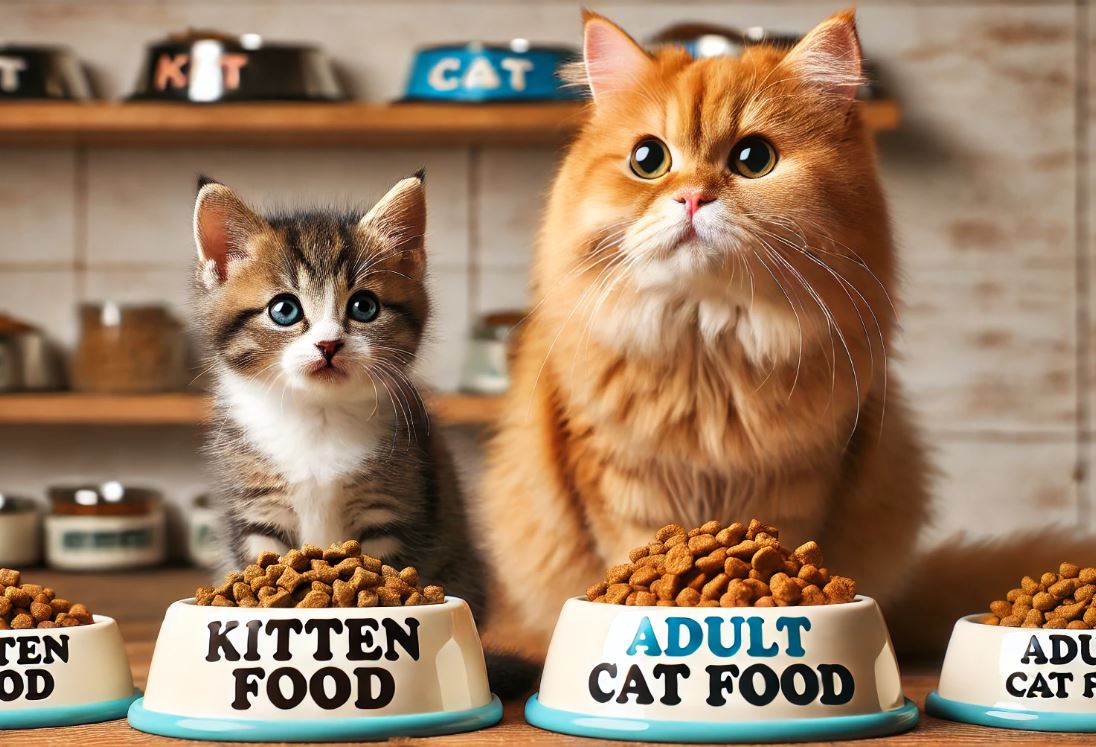I'm a participant in the Amazon Services LLC Associates Program, an affiliate advertising program designed to provide a means for me to earn fees by linking to Amazon.com and affiliated sites.
Introducing a kitten into your home brings immense joy and a multitude of responsibilities, especially when it comes to their diet. A common question that new cat owners ask is: “Can kittens eat adult cat food?” Understanding the nutritional needs of kittens and how they differ from adult cats is crucial for their healthy growth and development.
Be sure to check our guide on the Best Cat Dry Food for Indoor Cats.
Key Takeaways
- Kittens require different nutrients compared to adult cats.
- Feeding kittens adult cat food can lead to nutritional deficiencies.
- It’s essential to provide a diet formulated specifically for kittens to ensure proper growth and development.
Why Kittens Should Not Eat Adult Cat Food
Nutritional Needs of Kittens
Kittens are in a critical growth phase that requires a diet rich in specific nutrients to support their rapid development. Key nutrients that kittens need include:
- Higher Protein Content: Kittens need more protein than adult cats to build muscle and support growth.
- Increased Fat: Fats provide essential fatty acids and energy necessary for growth.
- Vitamins and Minerals: Nutrients like calcium and phosphorus are vital for bone development, while vitamins A and D support overall health.
Adult cat food is typically formulated to maintain the health of a fully grown cat, which means it might not have the optimal nutrient balance needed for a growing kitten.
Risks of Feeding Adult Cat Food to Kittens
Feeding kittens adult cat food can lead to several health issues:
- Nutritional Deficiencies: Adult cat food lacks the essential nutrients required for a kitten’s growth, potentially leading to stunted development and health problems.
- Digestive Issues: Kittens have different digestive capabilities compared to adult cats. Adult food might be too hard for kittens to digest, leading to gastrointestinal problems.
- Inadequate Caloric Intake: Kittens need more calories to support their active and growing bodies. Adult cat food might not provide enough calories, causing weight loss or poor growth.
Recent Developments in Kitten Nutrition – Can Kittens Eat Adult Cat Food?
As of July 2024, advancements in pet nutrition emphasize the importance of species and age-specific diets. New research highlights that a balanced diet tailored to the specific life stage of a pet can significantly improve health outcomes. Many pet food companies now invest in research to develop better formulas that cater to the precise needs of kittens.
Top Experts in Kitten Nutrition
Dr. Jennifer Coates
Dr. Jennifer Coates, a renowned veterinarian and pet nutrition expert, has extensively researched the dietary needs of kittens. She advocates for life-stage-specific diets and has contributed to numerous studies on pet health.
Dr. Susan Lauten
Dr. Susan Lauten, PhD, specializes in veterinary nutrition and works closely with pet food companies to create nutritionally balanced formulas. Her research supports the need for different diets for kittens and adult cats to ensure optimal health.
Dr. Sarah Abood
Dr. Sarah Abood, a veterinary nutritionist, emphasizes the importance of feeding kittens a diet specifically formulated for their growth needs. She advises pet owners to consult with veterinarians to choose the best food for their pets’ life stages.
Other Interesting Articles
For more insightful articles on pet care, check out the following:
- Best Dental Treats for Dogs
- Best Battery Operated Cat Water Fountain
- Greenies vs Whimzees
- Greenies vs Dentastix
Advantages and Disadvantages of Kitten Food vs. Adult Cat Food
Advantages of Kitten Food
- Tailored Nutrition: Formulated specifically to meet the high-energy and nutrient demands of kittens.
- Promotes Healthy Growth: Ensures kittens receive the right balance of nutrients for proper development.
- Digestibility: Designed to be easily digestible for young kittens.
Disadvantages of Kitten Food
- Higher Cost: Specialized formulas can be more expensive than standard adult cat food.
- Short-Term Use: Only necessary for the first year of a cat’s life before transitioning to adult cat food.
Advantages of Adult Cat Food
- Maintenance Nutrition: Provides balanced nutrition for adult cats to maintain their health.
- Wide Availability: Generally more accessible and comes in a variety of brands and formulas.
Disadvantages of Adult Cat Food
- Inadequate for Growth: Lacks the specific nutrients required for a kitten’s development.
- Potential Health Risks: Feeding it to kittens can lead to nutritional deficiencies and health issues.
Author: Pets Pal
Pets Pal is an expert in the field of pet nutrition, providing valuable insights and advice for many years. For more information, visit our other articles on Best Dental Treats for Dogs, Best Battery Operated Cat Water Fountain, Greenies vs Whimzees, and Greenies vs Dentastix.
